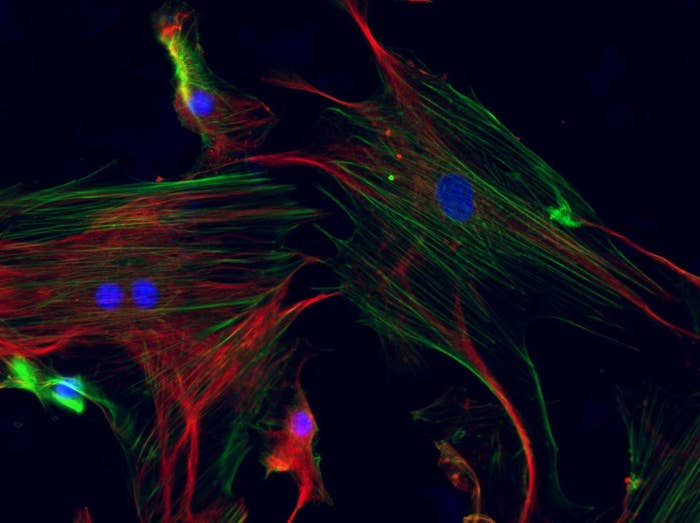
A Senate bill letting stem cell therapies skip over the most rigorous step of the FDA approval process is drawing fire from scientists worried about patient safety.
These high-profile researchers say that the proposed law could not only hurt desperately ill patients, but re-ignite political warfare in biomedicine like the stem cell wars of the 2000s.
Stem cells are the starting point for growth of many tissues affected by injury and disease, from blood to brain to bone. A gold rush in using “adult” stem cells harvested from umbilical cords, bone marrow, and fat has lead to more than 600 experimental trials to treat everything from heart attacks to Parkinson’s disease.
Despite a decade of scientific hype, progress has been slow in proving that these new treatments actually work. Some scientists are particularly frustrated with the slow pace of FDA review. In a Fox News op-ed published last month, for example, C. Randal Mills, the head of the prestigious California Institute for Regenerative Medicine (CIRM), called for the federal government to loosen its safety rules, promising “medical breakthroughs” for arthritis, back pain, and diabetes.
But other researchers say this is exactly the wrong approach.
“We have been telling people to cut down the stem cell hype, and then we turn around and have this talk about miracles and beautiful medicine,” Paul Knoepfler, a stem cell scientist at the University of California, Davis, told BuzzFeed News. “Wishful thinking here could have a whole slew of dangerous consequences.” Most worrisome, he said, is that desperately ill patients looking cures might end up with tumors instead.
At the center of the dispute is the “Regrow Act,” a bill introduced in the Senate in March. The bill would require the FDA to create a way to approve adult stem cell treatments without the large and costly “phase 3” human experiments typically needed to prove a new medical treatment is effective before it can be sold.
CIRM and Mills do not endorse or oppose the the bill, CIRM spokesperson Kevin McCormack told BuzzFeed News. But Mills co-wrote his op-ed about loosening FDA oversight with former Sen. Bill Frist, a surgeon and onetime Republican majority leader, whose Bipartisan Policy Center called for the Regrow Act’s changes in a report last year.
The bill was proposed by Sen. Mark Kirk of Illinois, a stroke survivor, and is supported by Sen. Susan Collins of Maine and Sen. Joe Manchin of West Virginia. A companion bill has been introduced in the House. If the bill passes, Kirk said in a statement, “we can help more patients live the life they want on their own terms.”
But skipping phase 3 trials, which are intended to demonstrate that therapies really work and not that they merely appear safe, might endanger patient health, say Knoepfler and other scientists.
“These politicians have no clue what they are talking about,” Jaime Imitola, a stem cell scientist at Ohio State University Wexner Medical Center, told BuzzFeed News. “The doctors who want to do this are passionate about their work and compassionate for their patients, but we have got to do this in a safe way or we could ruin the field.”
Imitola noted that when clinical trials go wrong, it can hobble an entire field. He pointed to two notorious incidents in gene therapy that still haunt researchers. In 1999, a phase 1 clinical trial (which is meant to test a treatment’s safety in people) at the University of Pennsylvania killed 18-year-old Jesse Gelsinger. In 2002, an experimental treatment for immune deficiency at the Necker Hospital for Sick Children in Paris gave four infants leukemia, setting the field back a decade.
The call for loosening FDA restrictions also works against long-running efforts by stem cell researchers to rein in stem cell clinics — a largely unregulated “wild west,” as some researchers have put it. These largely international clinics, made famous by sports celebrities such as Gordie Howe, Peyton Manning, and Bartolo Colon, offer untested stem cell treatments for up to $50,000.
On Wednesday, the New England Journal of Medicine reported the case of a 66-year-old stroke patient who had spent $300,000 on stem cell injections in Mexico, China, and Argentina. They led to him developing a massive tumor in his spine that paralyzed him.
“There is a real effort to collapse all kinds of stem cell treatments, good and bad, into something called ‘cellular therapies’,” Imitola said. Scientists will never know if stem cell treatments that show promise in early trials really do any good, he said, if the Regrow Act allows them to enter the world of stem cell clinics. As a result, they will never be tested rigorously against sham injections to rule out a placebo effect that might be the real cause of the cures ascribed to the cells by some patients.
Some patient advocacy groups, such as the National Stroke Association and the Alliance for Aging Research, are throwing their support behind the bill. Most of the opposition comes from researchers in the International Society for Stem Cell Research and the biotech industry’s Alliance for Regenerative Medicine (ARM).
“We are always willing to talk in a bipartisan way about helping patients,” ARM’s Michael Werner told BuzzFeed News. But the bill doesn’t do enough to protect patients, he said.
An overriding worry among stem cell scientists is that they will be drawn into long-running efforts by free-market advocates, such as former House speaker Newt Gingrich, to limit the FDA’s power, and once again be made into a Republican vs. Democrat political battleground. “Safety really should be settled by science, not politics,” Imitola said.
